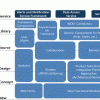Strategic advice to leverage new technologies
Technology is at the heart of nearly every enterprise, enabling new business models and strategies, and serving as the catalyst to industry convergence. Leveraging the right technology can improve business outcomes, providing intelligence and insights that help you make more informed and accurate decisions. From finding patterns in data through data science, to curating relevant insights with data analytics, to the predictive abilities and innumerable applications of AI, to solving challenging business problems with ML, NLP, and knowledge graphs, technology has brought decision-making to a more intelligent level. Keep pace with the technology trends, opportunities, applications, and real-world use cases that will move your organization closer to its transformation and business goals.
Recently Published
Businesses are faced with ever-increasing complexity, competition, and cost pressures. New products and "silver bullet" solutions are espoused by vendors, but more often than not, they fall short of expectations, and worse, add to the complexity of IT challenges. Yet, there is hope for getting a handle on this complexity and finally addressing the challenge of business/IT alignment. The approach is not based on a new product or technology but rather on an architectural foundation that brings the complexity of IT into focus from a business perspective.
Reuse Maturity Model: Establishing a Software Reuse Vocabulary
This Executive Update is mainly targeted for business executives, architects, and program managers. It provides an overview about how the most commonly debated concern about reuse benefits can be planned, measured, and quantified. The Update establishes a vocabulary that can be used by various stakeholders to report/request the reuse benefits for any development initiative or software project. It also helps architects and designers plan up front for components that can be candidates for a particular reuse.
In this issue of CBR, we set our sights on Big Data and how best to derive value from it. This is an increasingly critical topic (or should be!) for most organizations today, from the largest ones on down, as it becomes evermore evident that making full use of the institutional assets we have at our disposal will make sense on many levels. As Bill Gates said when he came to speak at Cornell University just a few years back, "Information technology and business are becoming inextricably interwoven.
There's a lot to think about when contemplating the value and use of the mass of data that is undoubtedly accumulating every day within your firm. In this issue of CBR, we provide you with a solid footing for understanding and moving forward with your own deliberations. In a manner of speaking, your data is the "bird in your hand" that you may not even know you hold — or have not yet developed the skills to hold. Reading what our experts have to say on the subject will provide a mental framework for approaching the decisions necessary to take advantage of the wealth of information at your fingertips.
Humans have been collecting data for several thousand years. In 3000 BC, Mesopotamians recorded inventory details in cuneiform. Today's society transmits exabytes of data every day as billions of people and millions of organizations manage their affairs. As Table 1 illustrates, the dominant issue facing each type of economy has changed over time, and the collection and use of data has evolved to reflect these concerns. Let's examine various economies and the critical question each faces.
Success in Managing "Big Data"
Technology around Big Data management has become of interest to most organizations due to the huge leap in the volume of data currently available and the expected geometric growth in volumes in the near future. One reason for the massive growth in data volumes comes from the reduction in size and cost of monitoring equipment, such as location monitoring of cell phones and RFID tag technology. People and things are constantly giving out information about their location and status.
Like many folks, I've become fascinated watching IBM's Watson playing the TV quiz show Jeopardy! As a result, I've been examining everything I can about it. In a nutshell, Watson is a pretty amazing system, and it's got me thinking just how smart it is and about what its significance may be when it comes to BI and decision support and corporate computing in general.








